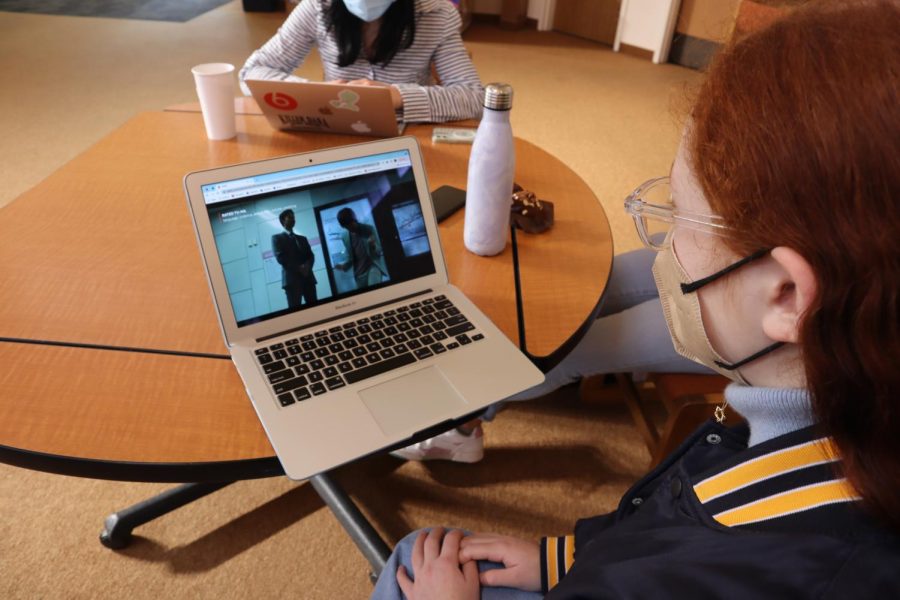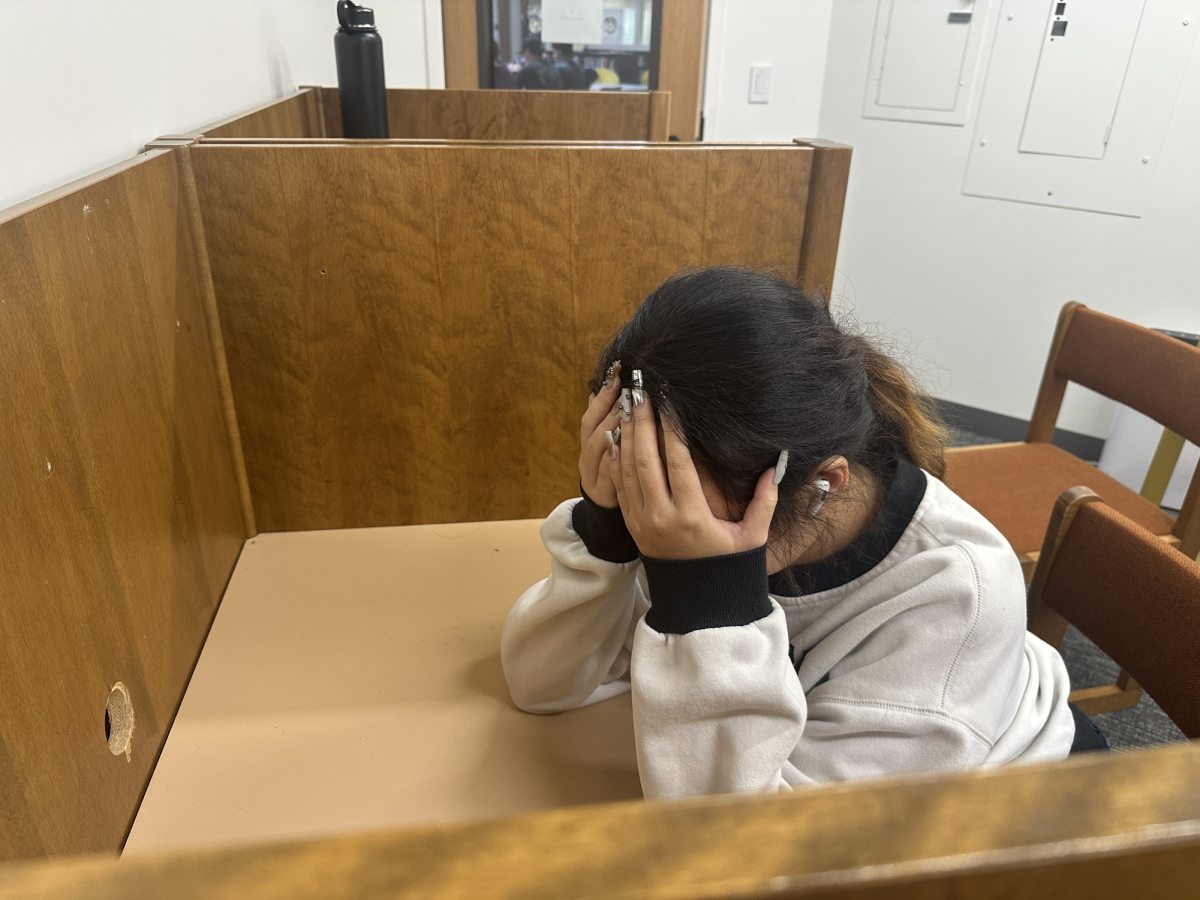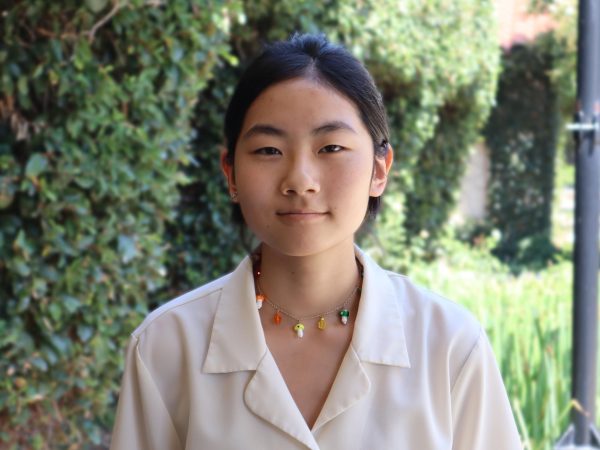Sitting on the blue benches in the outdoor eating area at my elementary school, I pull out my lunchbox amid the chatter of other fourth graders. As I open my homemade lunch of rice and kim (dried seaweed) arranged into a wrap called kimbap, I hear the familiar reaction. “What is that? It smells.” Yet again, I explain to them that yes, it is dried seaweed, and yes, I enjoy eating it. And inevitably, the interrogators launch into a series of questions, finishing their inquiries about my identity with a “What are you?” and a blank stare to my response, “I’m Korean.”
Now, after a spike in America’s knowledge of Korea, this type of situation is rare. Given the rise of Korean culture in American pop culture with shows like Squid Game and music like K-pop, most people I talk to know what Korea is at the very least. When I tell people I am Korean, I am often bombarded with questions about kimchi and badly pronounced Korean phrases. It is a welcome change from the puzzled stares I had previously recieved, but with it comes a strange sense of vulnerability.
With the new TV-show Squid Game featuring childhood games like ‘Ddakji’ and ‘Dalgona’, some of my very personal experiences are suddenly being abstracted to the world. I associate my childhood with many of the games and traditions now shown in the media. It feels invasive, to have after so many years a very personal and private part of your life suddenly exposed to the world.
But this sudden publicity and feeling of defenselessness left me wondering: is it just me? After all, this change is positive, removing Koreans and Korean Americans from complete anonymity and the prying, often insensitive questions. In social media, there is most often a positive association surrounding Korea, and the new knowledge of its culture gives America a more accurate image of Korea.
Much of Korean culture being portrayed in American media is comprised of traditions, games, or everyday activities that many Koreans have either participated in or seen. When I first heard of Squid Game, the game of Ddakji shown in the first episode reminded me of going to Chinese restaurants, folding the white chopstick wrappers after ripping the top off into paper squares. I remembered the stories my mom used to tell me about my uncle being reigning Ddakji champion in their area; and I remembered Sunday School, folding and making a Ddakji square with the fuzzy construction paper you can buy at almost any arts and crafts store.
At Webb, the closest people to the most accurate image of Korea are the Korean international students, because of their close connection to Korea; among them are Sehoon Kang (’24) and Naomi Kang (’24).
“Those are traditional games, but other than being traditional games, those are actually the games that I played with my friends when I was really young,” Sehoon said. “I mean, I’ve never felt those games to be special, but I like how that very ordinary culture in Korea is kind of smearing into American culture. Americans are enjoying it as well, right?”
While the increase in Korean culture leaking into American media can be beneficial to Koreans and Korean Americans, there is another side to Korean culture that is not shown in the media. Korea has a severe and lasting issue with misogyny and sexism—and this is a part of the unpleasant feelings that come with Korean publicity. Many times, these issues are covered up or ignored by America and its citizens in lieu of more entertaining sides of Korea.
“I think it reflects only on the good side and positive romanticized side of Korean culture, because yes, it is pleasing, yes, it is entertaining but there are a lot of dark sides behind the making of all these things,” Naomi said. “[Korea] tries to hide all the negative stuff about Korea with K-pop, K-drama and K-beauty . It creates a big stereotype. As a person from Korea, we have a really strict beauty standard. As a female, they instantly compare you to, for example, K-pop idols who obviously go on a very strict diet and who have a lot of plastic surgery and aesthetic surgeries. The fact that I’m being compared to them is unrealistic; it makes me feel like, ‘Oh, I have to be like that too’, and it gives me a lot of pressure as well.”
So maybe a part of the issue is the feeling of incompleteness in terms of the exposure of Korean culture in American media. It is good that Koreans are being recognized in America, but even after this exposure, stereotypes that are not necessarily more accurate are beginning to appear, replacing the general “Asian” stereotypes placed on Korea.
“I think people are going to try and learn more about and acknowledge Korean culture for what it is, and I think that’s wonderful, but of course, there are downsides to it,” Nathan Choi (’22) said. “For example, people will ask me far more often than other people if I watch K-dramas or if I listen to K-pop. And I’m not very knowledgeable about either, so people find themselves surprised. People will also ask me things like, ‘Oh, do you like kimchi?’, but I’m probably the only Korean who doesn’t. So people are generally surprised, more surprised than if I don’t like another food they think I would like.”
Throughout all my interviews of other Koreans and Korean Americans, I have noticed this common theme. The representation and spotlight on Korea help to alleviate invisibility, but the new stereotypes and intrusive questions that may come with it are not.
While common stereotypes reported varied among those I interviewed, the negative feeling associated with these new assumptions is consistent. The new expectation has also changed, from assuming Korean or Korean Americans to be Chinese, Japanese, or simply “Asian”, to asking if one likes to eat kimchi, watch K-dramas and listen to K-pop. There is more to being culturally and racially Korean than the world sees, and sometimes this depth can be ignored.
“There’s definitely a lot of positives, because when I was younger, there wasn’t really much representation of anything Korean, so that’s good,” Leslie Huh (’22) said. “But at the same time, it’s very clear when someone is kind of ignoring the rest of Korean culture and assuming they know a lot about it just because they consume mainstream drama. For example, just because they watch K-pop or K-drama [people] assume they know a lot about the culture, and they consume the very limited amount of culture while pretending to know.”
It is this sense of hypocrisy which feels so intrusive and uncomfortable: the assumption of some non-Koreans that just because they consume American mainstream content about Korea, they know more about it than Koreans do. This assumption stings especially after the history of Korean invisibility in America.
Despite the new knowledge about Korea, racism towards Asian-Americans has not stopped. Especially with the recent spike in anti-Asian hate, we have seen that just because mainstream culture may be beginning to accept Korea, it does not mean that racism and discrimination has stopped.
“I think Anti-Asian movements and hatred that people have towards Asian people is more deep-rooted than just the modern culture that they are perceiving right now,” Naomi said. “So, I don’t think I can give a definite answer of, ‘Yeah, because Korean culture is getting more popularized, people will hate less on Asians.’ Because that’s definitely not the case—I think people who have the mindset of ‘I hate Asians’ will not change because of the K-pop culture they get influenced by. I think the hatred they have towards Asian people is more deep-rooted than just culture.”
In fact, popular Korean culture can even be used as a weapon to attack Korean people.
“I dress really nice,” Nick Lee (’22) said. “That’s just something I like to do, I like to dress nice. And I remember my teammates—I played water polo which is a very conservative, white sport, which is really unfortunate—and I was called slurs, homophobic slurs for dressing nice, and they said, ‘It’s because you’re Korean, you dress like a K-pop star.’ And I remember being like, ‘Huh.’ These were my first experiences with this Korean culture and this Korean popularization in the US.”
The positive repercussions of the rise of Korean culture are undeniable. Although it may not have prevented anti-Asian hate or noticeably affected racism and discrimination against Asians and Asian-Americans in the United States, there has at least been a change in perspective towards those of Korean descent. The invisibility that used to pervade almost every discussion about culture and race was overcome when Korean culture became popular.
“And then comes ninth grade, I came to Webb, and everyone can only talk about BTS, Red Velvet, Blackpink, and it was awesome,” Nick said. “I grew up listening to Korean soul music, a lot of 2pm, a lot of GDragon, stuff like that, and I remember being like, ‘Oh yeah, this is the culture I know. This is the culture I recognize.’ And since then, it’s really taken off. Before, I thought it was going to be limited to music because of K-pop and the popularity of it, but when this broad array of Parasite, Squid Game arrived, you’re going to have this popularization of Korean Culture. I think it’s so awesome, especially within the last two years with movies.”
Even if it is only minor, racism towards Asian-Americans has also lessened. My parents used to tell me how when they went to school, they would be called racial slurs targeted towards Chinese and Japanese people. Being called a racially motivated slur that does not even describe you elicits a feeling almost impossible to describe: the feeling of not only being verbally attacked, but being called an offensive, inaccurate name is a strange type of awful. It is invisibility mixed with the perpetual racism against anyone non-white in America and the model minority myth.
“I think it’s a piece of invisibility, of being a perpetual foreigner, and the model minority myth,” said John Choi, Director of Equity and Inclusion. “Although it sounds great- you’re supposed to be good at math and you’re not as threatening as some of the other minorities- you’re also not included in leadership, not seen as someone who is a game-changer. You’re pretty much voiceless, innocuous, and the number one thing is that you’re invisible. Nobody sees that you’re even there.”
Comparing the experiences of my parents to conditions now, the environment has relatively improved. At the very least, people know what Korea is, and at the most, many people are informed and interested in what Korean or Korean American people have to say.
Overall, this change is a positive one: it is better to know a small amount, although limited, than to know nothing. Better to be asked, “Do you listen to K-pop?” or “How do you say hello in Korean?” than to be asked, “What are you?” But this very feeling of “improvement” upsets me. Why should I be happy with either response? The fear of reductionist stereotypes of Asian-Americans or more intrusive questions can sometimes cloud the happiness and pride I feel when I see Korean culture on the “big screen”.






![Many Webb students spend their free time in the library watching a popular TV show like Riverdale and Euphoria. “Based off what I’ve seen, like in Euphoria, because the actors are older, they don't showcase an actual high school life properly,” Sochika Ndibe (‘26) said. “Since [the actors] are older [and] playing a teenager, from a girl’s perspective, it is going to make you think you should look more developed at a young age.” The actor, who plays Veronica Lodge, was 22 years old at the time of filming.](https://webbcanyonchronicle.com/wp-content/uploads/2025/03/Antecol-Media-affects-how-society-functions-graphic-1200x900.png)









John Choi | Dec 10, 2021 at 3:49 PM
Eleanor, thank you for writing such a thoughtful piece and amplifying and centering our voices!